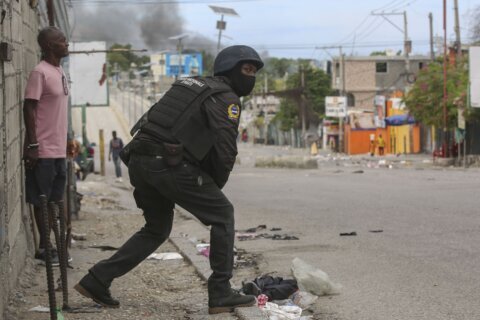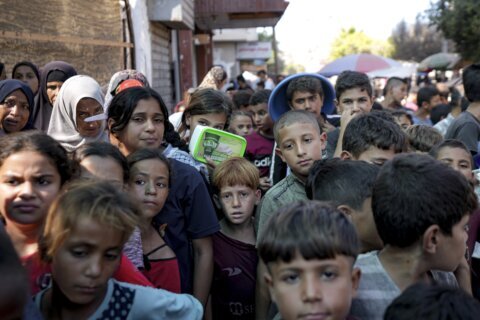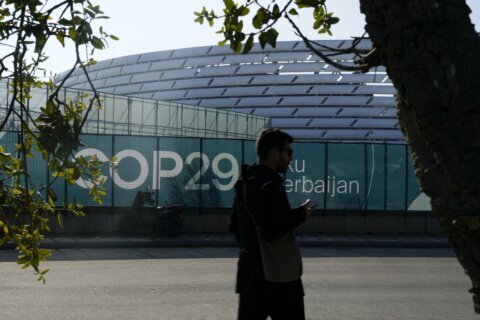BAKU, Azerbaijan (AP) — The Organization for Security and Cooperation in Europe said Thursday that Azerbaijan’s presidential election took place in a restrictive environment with no real political competition.
With just over 93% of the ballots counted, incumbent President Ilham Aliyev secured more than 92% of the votes, the head of the Central Election Commission, Mazahir Panahov, said early Thursday. Aliyev’s three main challengers trailed far behind and conceded the race, congratulating him, the Interfax Azerbaijan news agency reported.
Aliyev had called an early vote while enjoying a surge in popularity just months after his forces swiftly reclaimed the Karabakh region from ethnic Armenian separatists who had controlled it for three decades. He is now heading into another seven-year term in office.
The election Wednesday, “took place in a restrictive environment and … was marked with the stifling of critical voices,” said Artur Gerasymov, Special Co-Ordinator and leader of the OSCE group of election observers in Azerbaijan.
Aliyev was “not meaningfully challenged,” and because of limitations on independent media, civil society and other political parties, the contest was “devoid of genuine pluralism,” Gerasymov said. He added that the “near absence of analytical reporting” in Azerbaijani media hampered voters’ ability to make an informed choice.
Analysts suggested that Aliyev moved the election forward to capitalize on his burst in popularity following September’s blitz in Karabakh. He will be in the limelight in November when Azerbaijan, a country which relies heavily on revenues from fossil fuels, hosts a U.N. climate change conference.
Aliyev, 62, has been in power for more than 20 years, succeeding his father who was Azerbaijan’s Communist boss and then president for a decade when the country became independent after the 1991 collapse of the Soviet Union.
Several leaders congratulated Aliyev on his win including Turkish President Recep Tayyip Erdogan, Hungary’s Prime Minister Viktor Orban and Iran’s Ebrahim Raisi.
Russian President Vladimir Putin called Aliyev and the two spoke about continuing their “strategic partnerships,” according to the Azeri leader’s press service.
Ukraine’s Volodymyr Zelenskyy posted his congratulations on X, formerly known as Twitter, saying that he appreciated Azerbaijan’s humanitarian assistance to Ukraine and valued the “mutual support for our states’ sovereignty and territorial integrity.”
Election officials indicated turnout in the election was strong, saying that over 76% of eligible voters cast ballots during the 11-hour voting. Even before the preliminary results were announced, several hundred people carrying Azerbaijani flags gathered in Baku to dance and sing in celebration.
Aliyev has declared that he wanted the election to “mark the beginning of a new era,” in which Azerbaijan has full control over its territory. He and his family cast their ballots in Khankendi, a city that was called Stepanakert by Armenians when it housed the headquarters of the self-declared separatist government.
The region, which had been known internationally as Nagorno-Karabakh, and large swaths of surrounding territory came under full control of ethnic Armenian forces backed by Armenia at the end of a separatist war in 1994.
Azerbaijan regained parts of Karabakh and most of the surrounding territory in 2020 in a six-week war, which ended with a Moscow-brokered truce. In December 2022, Azerbaijan started blockading the road linking the region with Armenia, causing food and fuel shortages, and then launched a September blitz that routed separatist forces in just one day and forced them to lay down arms.
More than 100,000 ethnic Armenians fled the region after the defeat of separatist forces, leaving it nearly deserted.
When he visited the city in November, Aliyev said in a speech at a military parade marking the victory that “we showed the whole world the strength, determination and indomitable spirit of the Azerbaijani people.”
In Fuzuli, the Azerbaijani city near Karabakh that was controlled by Armenian forces until 2020, 73-year-old Raya Feyziyeva, said on election day that she was “feeling great” and was grateful to Aliyev for reclaiming her hometown. She said she was forced to leave Fuzuli after its takeover by Armenian forces and the expulsion of its ethnic Azerbaijani population in 1993.
“I feel calm knowing that I will be buried in my native land,” she said.
In the village of Agali in the Zangilan region, another area near Karabakh that was reclaimed from Armenian forces, turnout was equally strong. Mubariz Farhadov, who is in charge of the local polling station set up in a newly built school, said he was filled with joy to witness a “historic moment” when “elections are held in our native land for the first time in 30 years.”
There is no limit on the number of terms Aliyev can serve, and the six other candidates represented no real challenge. Some of them have previously publicly praised Aliyev.
Aliyev’s time in power has been marked by the introduction of increasingly strict laws that curb political debate as well as arrests of opposition figures and independent journalists — including in the run-up to the presidential election.
Azerbaijan’s two main opposition parties — Musavat and the People’s Front of Azerbaijan — did not take part in the vote, and some opposition members alleged it may have been rigged.
Copyright © 2024 The Associated Press. All rights reserved. This material may not be published, broadcast, written or redistributed.







